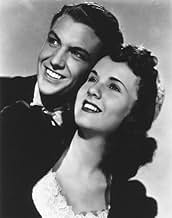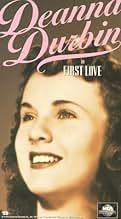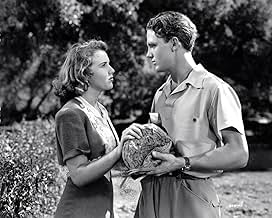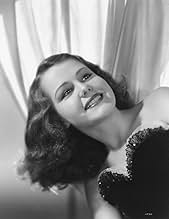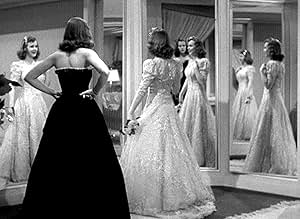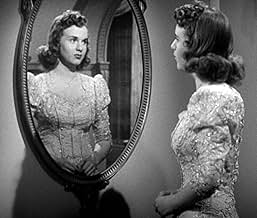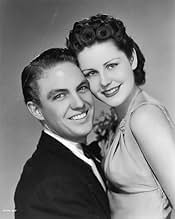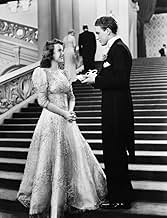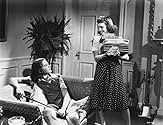AVALIAÇÃO DA IMDb
7,0/10
822
SUA AVALIAÇÃO
Adicionar um enredo no seu idiomaAn orphaned boarding school graduate secretly attends a prestigious ball, where she falls for the boyfriend of her snobbish cousin.An orphaned boarding school graduate secretly attends a prestigious ball, where she falls for the boyfriend of her snobbish cousin.An orphaned boarding school graduate secretly attends a prestigious ball, where she falls for the boyfriend of her snobbish cousin.
- Direção
- Roteiristas
- Artistas
- Indicado a 2 Oscars
- 4 vitórias e 2 indicações no total
Avaliações em destaque
Young Deanna Durbin goes to live with her uncle Eugene Palette and a group of snooty society cousins in this film. They treat her like a country cousin and snub her generally including her aunt by marriage. But little do they know that Deanna is destined to find her First Love in this story reworked from the Cinderella fairy tale.
After three years Deanna was growing up on screen and the folks at Universal Pictures decided she ought to have her first screen kiss. The one tapped for the honor was a guy making his screen debut Robert Stack.
The one who really treats her rotten is her débutante cousin Helen Parrish and her equally snobby friend June Storey. Deanna is not treated any better than one of the staff at her house, like Cinderella she might as well be relegated to being a chimney sweep.
Stack is the guy that Parrish and Storey have set their caps for, he's another society kid. But he likes simple and unaffected Deanna who ironically Parrish sets up the meeting between them. That's a rather funny scene.
Some good songs for Durbin highlighted the classic There's No Place Like Home, Amapola, and Un Bel Di from Madame Butterfly. And of course one of the most publicized kisses ever in screen history.
First Love brought home Oscar nominations for Sound, Art&Set Decoration, and Musical Scoring for Universal Pictures. Little Miss Fix-It was definitely growing up and her future roles would show a maturing Durbin for the movie-going public. It still is fine entertainment.
After three years Deanna was growing up on screen and the folks at Universal Pictures decided she ought to have her first screen kiss. The one tapped for the honor was a guy making his screen debut Robert Stack.
The one who really treats her rotten is her débutante cousin Helen Parrish and her equally snobby friend June Storey. Deanna is not treated any better than one of the staff at her house, like Cinderella she might as well be relegated to being a chimney sweep.
Stack is the guy that Parrish and Storey have set their caps for, he's another society kid. But he likes simple and unaffected Deanna who ironically Parrish sets up the meeting between them. That's a rather funny scene.
Some good songs for Durbin highlighted the classic There's No Place Like Home, Amapola, and Un Bel Di from Madame Butterfly. And of course one of the most publicized kisses ever in screen history.
First Love brought home Oscar nominations for Sound, Art&Set Decoration, and Musical Scoring for Universal Pictures. Little Miss Fix-It was definitely growing up and her future roles would show a maturing Durbin for the movie-going public. It still is fine entertainment.
Deanna Durbin is the poor cousin of a rich family. She attends Kathleen Howard's girl's school with cousin Helen Parish, and gets invited to their New York mansion for Christmas break. Even though uncle Eugene Pallette seems nice enough -- what little is seen of him -- the rest of the family is a bunch of weirdos and nasties. She wants to go to the ball, but has to wear cast-off clothes. But the mansion's staff, who adore her for singing for them, club together and rent an expensive outfit. When Miss Parish orders her not to go to the ball....
Miss Durbin was Universal's biggest star, but how were they to deal with the fact that she was now 17 and could no longer be Little Miss Fix-It? Her production team, consisting of Henry Koster and Joe Pasternak decided to write her a Cinderella story, with newly-hired Robert Stack as Prince Charming. Of course there are musical interludes, an old-fashioned ballad or two, and a selection of opera arias. The writing team kept everything familiar, including borrowing liberally from My Man Godfrey to make sure that Miss Durbin's fans wouldn't be too outraged.
Miss Durbin was Universal's biggest star, but how were they to deal with the fact that she was now 17 and could no longer be Little Miss Fix-It? Her production team, consisting of Henry Koster and Joe Pasternak decided to write her a Cinderella story, with newly-hired Robert Stack as Prince Charming. Of course there are musical interludes, an old-fashioned ballad or two, and a selection of opera arias. The writing team kept everything familiar, including borrowing liberally from My Man Godfrey to make sure that Miss Durbin's fans wouldn't be too outraged.
"First Love" was a major transition for Universal star Deanna Durbin, as she was being positioned to shift from child star to engenue (something that Fox was inevitably unable to accomplish with Shirley Temple at the same time). While the film is not an overblown epic, it's lavish in the details, and carefully produced to give the whole piece a maximum of charm. To today's audiences, it might be a bit saccharine, but if you can dial down the cynicism of our age, the film's positive points grow.
Durbin plays much more subtly in this film than she had in many of her earlier films--signalling that she was now "maturer" instead of being a juvenile whirlwind ball of energy like she had been in "Three Smart Girls" and "100 Men and a Girl." Her beau, played by an impossibly young (and almost scarily good looking) Robert Stack, gives Durbin her first screen kiss--a source of major publicity for the film at the time.
The story is an updated Cinderella/screwball comedy, which nevertheless allows Durbin's character to break out into a few operatic arias throughout the film (this also takes some getting used to for modern audiences). The most memorable part of the film, suitably, happens during "the ball," where Durbin and Stack dance for the first time. Employing a charming idea, a shot of a crowded dance floor dissolves to a shot of just the duo dancing, to imply how the pair are so involved with each other that the rest of the world has faded away. If you like stuff like this, then you'll revel in the rest of the film.
Durbin plays much more subtly in this film than she had in many of her earlier films--signalling that she was now "maturer" instead of being a juvenile whirlwind ball of energy like she had been in "Three Smart Girls" and "100 Men and a Girl." Her beau, played by an impossibly young (and almost scarily good looking) Robert Stack, gives Durbin her first screen kiss--a source of major publicity for the film at the time.
The story is an updated Cinderella/screwball comedy, which nevertheless allows Durbin's character to break out into a few operatic arias throughout the film (this also takes some getting used to for modern audiences). The most memorable part of the film, suitably, happens during "the ball," where Durbin and Stack dance for the first time. Employing a charming idea, a shot of a crowded dance floor dissolves to a shot of just the duo dancing, to imply how the pair are so involved with each other that the rest of the world has faded away. If you like stuff like this, then you'll revel in the rest of the film.
Deanna Durbin stars with Robert Stack, Helen Parrish, Leatrice Joy, Eugene Palette, and Kathleen Howard in "First Love," a 1939 update of the Cinderella story, with Deanna receiving her first screen kiss.
I first had to get over seeing Robert Stack so young - omg.
Deanna plays Constance Harding, an orphan who is spending the summer after her graduation with relatives. It's a sterile household with her uncle (Pallette) who doesn't want any noise and prefers his family be out of the house when he's there; an unbelievable brat of a cousin, Barbara (Parrish); and an airhead aunt (Joy). The only warmth available comes from the servants.
While her mother is busy doing astrology charts, Barbara enjoys the life of a much-photographed socialite and woman about town who has a closet the length of one wall. She's after the most eligible bachelor in town, Ted Drake.
One day, she doesn't wake up when she is called at noon and instead gets up at 2. She is invited to go riding at 2:30 with Ted and some others. Because she will be late, she sends Constance to the country club to hold Ted there by any means necessary. Constance does as she's told, but develops a crush on Ted.
The family is then invited to a fabulous party at Ted's. The servants get together and buy Constance a beautiful dress, a corsage, and a wrap from someone's relative.
Barbara takes one look at her and makes up a reason why Constance needs to stay home -- something Barbara's brother knew was going to happen all along. But unseen forces are at work.
This is Deanna before my favorite part of her career, which is a little later. As a little girl, she was too energetic and her speaking voice too high-pitched for me.
Here, she is delightful, but her singing voice, particularly the top, is thin. Later on, it would open up and be glorious. And Un Bel Di in English - it sounded like they took the literal translation and just had her sing it, with the words not only awkward, but out of order. Not a good choice for her, as the aria is for a much bigger sound, though it fit in very well with the theme.
What made this film a bittersweet experience for me was the beautiful acting of Kathleen Howard as the old maid with a cane, Miss. Wiggins. In those days, if you weren't married, you were nobody, and Miss Wiggins, beloved by her students, exemplifies that.
You can tell by the way she talks that she believes life passed her by, but being a strong woman, she has gone on and made the best of it. The end frame of her made me cry. Such an affecting, poignant performance.
I loved this film. Deanna's first kiss garnered a lot of attention; later, the first kiss was tried with Shirley Temple, but in 1942 wartime, no one cared.
I first had to get over seeing Robert Stack so young - omg.
Deanna plays Constance Harding, an orphan who is spending the summer after her graduation with relatives. It's a sterile household with her uncle (Pallette) who doesn't want any noise and prefers his family be out of the house when he's there; an unbelievable brat of a cousin, Barbara (Parrish); and an airhead aunt (Joy). The only warmth available comes from the servants.
While her mother is busy doing astrology charts, Barbara enjoys the life of a much-photographed socialite and woman about town who has a closet the length of one wall. She's after the most eligible bachelor in town, Ted Drake.
One day, she doesn't wake up when she is called at noon and instead gets up at 2. She is invited to go riding at 2:30 with Ted and some others. Because she will be late, she sends Constance to the country club to hold Ted there by any means necessary. Constance does as she's told, but develops a crush on Ted.
The family is then invited to a fabulous party at Ted's. The servants get together and buy Constance a beautiful dress, a corsage, and a wrap from someone's relative.
Barbara takes one look at her and makes up a reason why Constance needs to stay home -- something Barbara's brother knew was going to happen all along. But unseen forces are at work.
This is Deanna before my favorite part of her career, which is a little later. As a little girl, she was too energetic and her speaking voice too high-pitched for me.
Here, she is delightful, but her singing voice, particularly the top, is thin. Later on, it would open up and be glorious. And Un Bel Di in English - it sounded like they took the literal translation and just had her sing it, with the words not only awkward, but out of order. Not a good choice for her, as the aria is for a much bigger sound, though it fit in very well with the theme.
What made this film a bittersweet experience for me was the beautiful acting of Kathleen Howard as the old maid with a cane, Miss. Wiggins. In those days, if you weren't married, you were nobody, and Miss Wiggins, beloved by her students, exemplifies that.
You can tell by the way she talks that she believes life passed her by, but being a strong woman, she has gone on and made the best of it. The end frame of her made me cry. Such an affecting, poignant performance.
I loved this film. Deanna's first kiss garnered a lot of attention; later, the first kiss was tried with Shirley Temple, but in 1942 wartime, no one cared.
Two very young actors make up this cinderella story, Robert Stack (just 20) is the hero and Deanna at 18 still has quite a bit of puppy fat on her face (I didn't like the hair style - was it to make her seem older? ). She, an Orphan like Cinderella lands up in - not step mother here, but rich maternal uncle's home. Here of course there was one cousin, of the step-sister type the other cousin of opposite gender, the aunt and even the uncle are really not villainish by nature, but villain by the lack of empathy, not only towards our Cinderella, but towards the whole world.
There are of course nice songs too, has to be when Deanna is there. The movie is well made, and very watch-able, and of course the end is predictable in any fairy tale. Along with Deanna there are two more lovely girls, Helen Parish (the Cousin), a quite frequent co-actor of Deanna, and June Storey, another Canadian, both trying to win the Prince Charming.
There are two interesting things here, one puzzled me, till I understood what it was and other one, the main song, wasn't properly visualised.
If there is a call to sing a Strauss' waltz, even if you specify it is the Junior's, unless you know which one it is, no one can sing it. More so, it had been told to have a bit of modifications, some bars were changed, probably to cater to her voice-spectrum by the singer, Mme Cottellini, who was supposed to sing it, mentioned. Even more problem in it was, that even had she caught the opening, she still would have been in for a trouble, since it was a mix of three of Strauss' Waltzs, Schatz-Walzer, the beautiful Rosen aus dem Süden(the main body) and lagunen Walzer (finale) : unless one knows that, it would be impossible.
The interesting and wonder-ful (not necessary wonderful) portion was, after this waltz, when Deanna was dancing with Stack, I observed there was something in her left hand, what was it I wondered.... and then it struck me. That was the cloak-ticket. And she had retained it, held between the forefinger and middle finger of her hand, till she exchanged it for cloak. In fact she had been playing with it, even during the 'spring waltz'. This was unexpected that one would go for that much precision. I wonder who thought about it, Koster or Deanna ? I am sure the viewers won't have noticed it, or even wondered if it wasn't there (you could have some pocket or fold in the dress to keep it).
There are of course nice songs too, has to be when Deanna is there. The movie is well made, and very watch-able, and of course the end is predictable in any fairy tale. Along with Deanna there are two more lovely girls, Helen Parish (the Cousin), a quite frequent co-actor of Deanna, and June Storey, another Canadian, both trying to win the Prince Charming.
There are two interesting things here, one puzzled me, till I understood what it was and other one, the main song, wasn't properly visualised.
If there is a call to sing a Strauss' waltz, even if you specify it is the Junior's, unless you know which one it is, no one can sing it. More so, it had been told to have a bit of modifications, some bars were changed, probably to cater to her voice-spectrum by the singer, Mme Cottellini, who was supposed to sing it, mentioned. Even more problem in it was, that even had she caught the opening, she still would have been in for a trouble, since it was a mix of three of Strauss' Waltzs, Schatz-Walzer, the beautiful Rosen aus dem Süden(the main body) and lagunen Walzer (finale) : unless one knows that, it would be impossible.
The interesting and wonder-ful (not necessary wonderful) portion was, after this waltz, when Deanna was dancing with Stack, I observed there was something in her left hand, what was it I wondered.... and then it struck me. That was the cloak-ticket. And she had retained it, held between the forefinger and middle finger of her hand, till she exchanged it for cloak. In fact she had been playing with it, even during the 'spring waltz'. This was unexpected that one would go for that much precision. I wonder who thought about it, Koster or Deanna ? I am sure the viewers won't have noticed it, or even wondered if it wasn't there (you could have some pocket or fold in the dress to keep it).
Você sabia?
- CuriosidadesDeanna Durbin's character gives her birthdate as 4 December - Durbin's own.
- Erros de gravaçãoThe movement of Deanna during the scene with her mirror.
- Citações
Miss Wiggins: The trouble with you young people is you don't believe in anything. You're afraid, afraid of hope, afraid of happiness.
- ConexõesFeatured in Laços Eternos (1943)
Principais escolhas
Faça login para avaliar e ver a lista de recomendações personalizadas
- How long is First Love?Fornecido pela Alexa
Detalhes
- Data de lançamento
- País de origem
- Idioma
- Também conhecido como
- First Love
- Locações de filme
- Empresa de produção
- Consulte mais créditos da empresa na IMDbPro
- Tempo de duração1 hora 24 minutos
- Cor
- Proporção
- 1.37 : 1
Contribua para esta página
Sugerir uma alteração ou adicionar conteúdo ausente

Principal brecha
By what name was O Primeiro Amor (1939) officially released in Canada in English?
Responda
